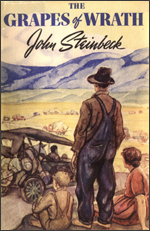| |
Pre-1950s |
| |
The Awakening, Kate Chopin
Black Spring, Henry Miller
Brideshead Revisited, Evelyn Waugh
A Christmas Carol, Charles Dickens
Crime and Punishment, Fyodor Dostoyevsky
Demian, Hermann Hesse
Embers, Sándor Márai
Frankenstein, Or, The Modern Prometheus, Mary Shelley
The Grapes of Wrath, John Steinbeck
The Heart is a Lonely Hunter, Carson McCullers
Howards End, E.M. Forster
The Iceman Cometh, Eugene O’Neill
In Our Time, Ernest Hemingway
The Man with the Golden Arm, Nelson Algren
Metamorphosis, Franz Kafka
The Picture of Dorian Gray, Oscar Wilde
The Poetical Works of John Keats, John Keats
The Sheltering Sky, Paul Bowles
Lost Face, Jack London
Nineteen Eighty-Four, George Orwell
The Poems of Dylan Thomas, Dylan Thomas
To the Lighthouse, Virginia Woolf
Wuthering Heights, Emily Brontë |
|
|
The Grapes of Wrath, John Steinbeck
Viking Press, 1939, (US)
I have been thinking a lot about John Steinbeck’s The Grapes of Wrath lately. The U.S. economy has been in a rut for at least two years. Turn to any news media, and there are countless reports about the recession and/or the possibility of a “double-dip" recession. Fall is upon us, and, historically, September is a dreadful month for stocks; investors dump losers in a last-ditch effort to gussy up portfolios by the year’s end. The Dow currently slogs in negative territory. The S&P is also heading south. Consumer confidence jitters skittishly. Housing sales the past couple of months have been the worst on record. In addition, unemployment remains locked at nearly ten percent and shows no sign of recovery. These are and have been rough times for millions.
Economic facts and figures are not why the novel’s fictional Joad family keeps popping into my head, though. Anyone who has absorbed The Grapes of Wrath knows it is not a dry statistical record of financial data. Rather, the novel is a tale about the plight of migrant workers during the Great Depression. What the average American family experiences today does not compare to the type of poverty that overtook the U.S. and globe back in the 1930s. Nevertheless, the book is urgently relevant.
Hardship, disease, loss and despair imbue the novel. Yet, despite a flood of misery, the reason why the characters and situations are unforgettable is due to Steinbeck’s illumination on hope amidst a barrage of harsh challenge.
The word hope, I must say, has taken a bit of a beating the last two years, considering a successful presidential campaign dangled the four letters in front of Americans for some time, but, now that the then-candidate holds the highest office in the land, he has not fully delivered on its promise. The fact stands that hope is not a feeling resulting from a wish or something that materializes out of Election Day.
A single person may initiate a movement toward a more optimistic future; however, if action among the masses does not take hold, then the power of one is no match for the might of the multitude. The point gets more to the core of my recent meditations.
A central theme in The Grapes of Wrath explores the concept of “I” to “We.” In short, societies prosper best when there is a shift in focus from what the individual does for himself to the strength of what the collective may achieve for the whole. Promise, Steinbeck assures, follows when one looks beyond oneself and reaches out to aid one’s fellow citizen, even in the most primitive act of kindness.
The concept is simple enough. Unfortunately, the notion gets readily disregarded, as “We” lose ourselves in the “I.” A quick reflection back to Steinbeck’s pages serves as a reminder to strive to do more for others, especially during times of recession.
The depth of my civic contribution is, bottom line, why my thoughts fixate on The Grapes of Wrath. I am aware that I may always do more to practice the selfless principles so vividly displayed in the novel. I question: When is the last time I stood in a soup kitchen and let my hands touch the flesh of someone who does not have half the common luxuries I take for granted? Have I ever?
People are in need. We can make a difference. Yes, we can.
-MEG

|
|
 |

